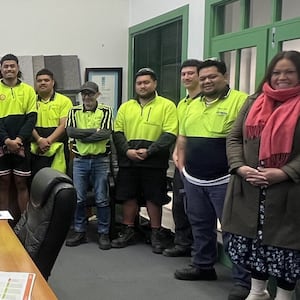World
Otago Launches Project Fetu to Train Pacific and Rural Workers

A new government initiative, Project Fetu, has launched in Otago with the aim of retraining Pacific and rural workers facing employment uncertainties. This pioneering program seeks to address the barriers to formal education that often hinder access to job training, thus opening up new career opportunities for those in vulnerable employment situations.
Project Fetu emerges in response to significant downsizing by primary industry manufacturers in regional areas, which has created economic instability in rural towns. In many cases, a single large employer dominates the local job market, heightening the risk of job losses and leaving workers with limited options. The initiative aims to provide these individuals with the skills needed to adapt to a changing job landscape.
According to local industry leaders, if Project Fetu proves successful, it could serve as a model for delivering training in rural areas lacking local tertiary education infrastructure. The initiative is designed not only to tackle inequalities in access to education but also to help close critical technology skill gaps currently affecting the manufacturing sector across New Zealand.
Addressing Workforce Challenges
The need for a sustainable workforce pipeline is pressing, as the manufacturing sector grapples with evolving technological demands. Industry experts emphasize that enhancing local skills will drive productivity and contribute significantly to both regional and national economic growth. By providing tailored training programs, Project Fetu aims to ensure that Pacific and rural workers can secure meaningful employment in an increasingly competitive job market.
Data indicates that regions heavily reliant on a single employer face unique challenges. As businesses contract, entire communities can suffer economically and socially. Therefore, initiatives like Project Fetu are critical in helping to diversify skill sets and reduce reliance on a limited number of employment opportunities.
The program’s design focuses on integrating culturally relevant training that respects and acknowledges the unique backgrounds of Pacific and rural workers. By fostering an inclusive learning environment, Project Fetu aims to empower participants to thrive in their careers while also contributing positively to their communities.
A Broader Vision for Training
If successful, Project Fetu could not only transform individual lives but also reshape the landscape of workforce training in rural New Zealand. The pilot program may offer valuable insights into how training can be effectively delivered in areas where traditional educational resources are limited.
The initiative represents a significant step towards creating equitable access to education and training for all workers, regardless of their geographical location. As the program unfolds, its impact on local economies and the broader manufacturing sector will be closely monitored, with hopes that it will become a blueprint for similar future projects.
In summary, Project Fetu is more than just a training initiative; it is a strategic response to an evolving job market and a commitment to supporting the livelihoods of Pacific and rural workers in Otago. Through this program, the government aims to foster resilience and adaptability in a workforce that is essential for the region’s economic vitality.
-

 World3 months ago
World3 months agoTest Your Knowledge: Take the Herald’s Afternoon Quiz Today
-

 Sports3 months ago
Sports3 months agoPM Faces Backlash from Fans During Netball Trophy Ceremony
-

 Lifestyle3 months ago
Lifestyle3 months agoDunedin Designers Win Top Award at Hokonui Fashion Event
-

 Sports3 months ago
Sports3 months agoLiam Lawson Launches New Era for Racing Bulls with Strong Start
-

 Lifestyle3 months ago
Lifestyle3 months agoDisney Fan Reveals Dress Code Tips for Park Visitors
-

 World4 months ago
World4 months agoCoalition Forms to Preserve Māori Wards in Hawke’s Bay
-

 Health3 months ago
Health3 months agoWalking Faster Offers Major Health Benefits for Older Adults
-

 Politics3 months ago
Politics3 months agoScots Rally with Humor and Music to Protest Trump’s Visit
-

 Top Stories4 months ago
Top Stories4 months agoUK and India Finalize Trade Deal to Boost Economic Ties
-

 Entertainment3 months ago
Entertainment3 months agoExperience the Excitement of ‘Chief of War’ in Oʻahu
-

 World4 months ago
World4 months agoHuntly Begins Water Pipe Flushing to Resolve Brown Water Issue
-

 Science4 months ago
Science4 months agoNew Interactive Map Reveals Wairarapa Valley’s Geological Secrets









